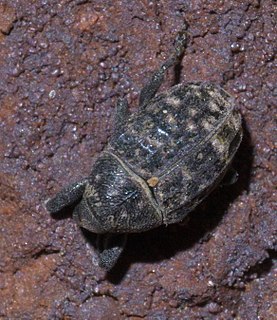
The Integrated Taxonomic Information System (ITIS) is an American partnership of federal agencies designed to provide consistent and reliable information on the taxonomy of biological species. ITIS was originally formed in 1996 as an interagency group within the US federal government, involving several US federal agencies, and has now become an international body, with Canadian and Mexican government agencies participating. The database draws from a large community of taxonomic experts. Primary content staff are housed at the Smithsonian National Museum of Natural History and IT services are provided by a US Geological Survey facility in Denver. The primary focus of ITIS is North American species, but many biological groups exist worldwide and ITIS collaborates with other agencies to increase its global coverage.

Anthribidae is a family of beetles also known as fungus weevils. The antennae are not elbowed, may occasionally be longer than the body and thread-like, and can be the longest of any members of Curculionoidea. As in the Nemonychidae, the labrum appears as a separate segment to the clypeus, and the maxillary palps are long and projecting.

The Catalogue of Life is an online database that provides the most comprehensive and authoritative index of known species of animals, plants, fungi, and microorganisms. It was created in 2001 as a partnership between the global Species 2000 and the American Integrated Taxonomic Information System. The Catalogue interface is available in twelve languages and is used by research scientists, citizen scientists, educators, and policy makers. The Catalogue is also used by the Biodiversity Heritage Library, the Barcode of Life Data System, Encyclopedia of Life, and the Global Biodiversity Information Facility. The Catalogue currently compiles data from 168 peer-reviewed taxonomic databases, that are maintained by specialist institutions around the world. As of 2019, the Catalogue lists 1,837,565 of the world's 2.2m extant species known to taxonomists on the planet at present time.

The Phalangodidae are a family of harvestmen with about 30 genera and more than 100 described species, distributed in the Holarctic region.
Mirosternus parcus is a species of beetle in the family Ptinidae.

Clivina is a genus of ground beetle native to the Palearctic, the Nearctic, the Near East and North Africa. There are at least 580 described species in Clivina.

Chrysobothris is a genus of metallic wood-boring beetles in the family Buprestidae. There are at least 690 described species in Chrysobothris.

The Ropalomeridae are a family of acalyptrate flies.

The Aphrophoridae or spittlebugs are a family of insects belonging to the order Hemiptera. There are at least 160 genera and 990 described species in Aphrophoridae.
Hyloxalus parcus is a species of frogs in the family Dendrobatidae. It is endemic to Ecuador where it is only known from its type locality in the Zamora-Santiago Provinceat elevation of 1,981 m (6,499 ft) asl.
Osorius is a genus of unmargined rove beetles in the family Staphylinidae. There are about nine described species in Osorius.

Stenoscelis is a genus of snout and bark beetles in the family Curculionidae. There are at least 30 described species in Stenoscelis.
Lixus parcus, the knotweed weevil, is a species of snout or bark beetle in the family Curculionidae. It is found in North America.

Pinophilus is a genus of rove beetles in the family Staphylinidae.

Chaoborus punctipennis is a species of phantom midges.

Rhyssomatus is a genus of true weevils in the beetle family Curculionidae. There are at least 180 described species in Rhyssomatus.

Coptocycla texana, the anacua tortoise beetle, is a species of tortoise beetle in the family Chrysomelidae. It is found in Central America and North America.
Aidophus is a genus of aphodiinae dung beetles in the family Scarabaeidae. There are about 12 described species in Aidophus.
Gyrinus parcus is a species of whirligig beetle in the family Gyrinidae. It is found in Central America, North America, and South America.
Aidophus skelleyi is a species of aphodiine dung beetle in the family Scarabaeidae. It is found in North America.












